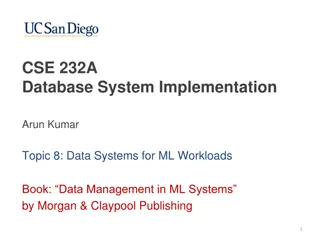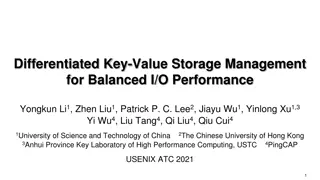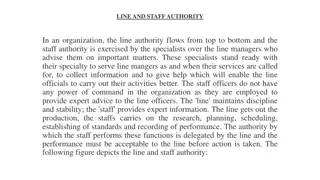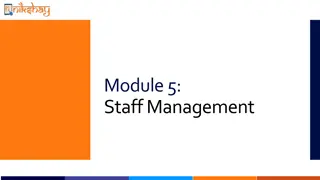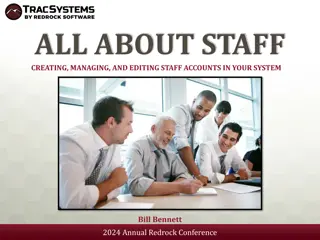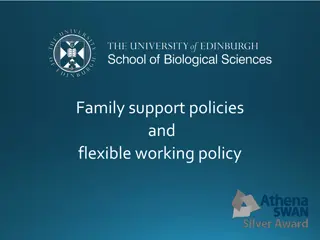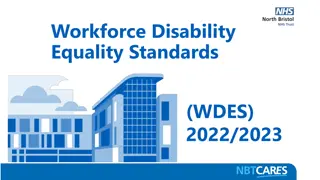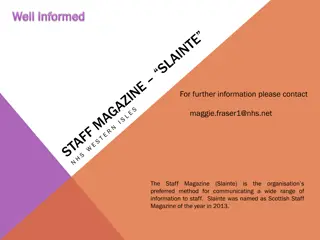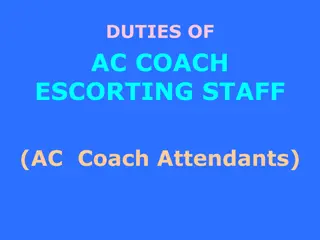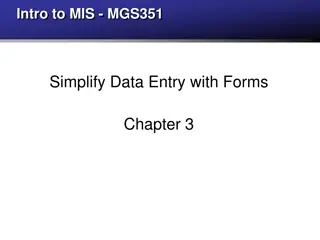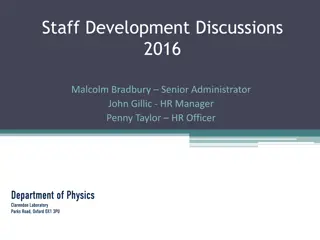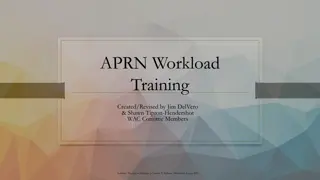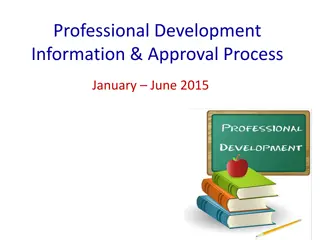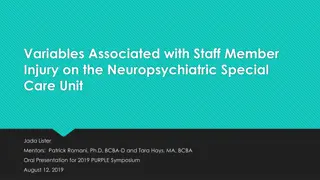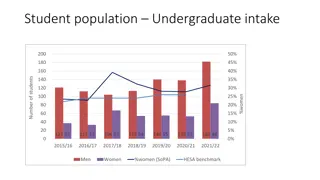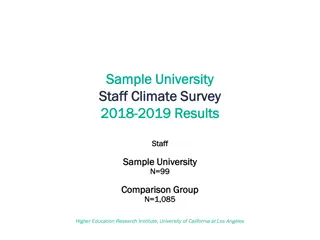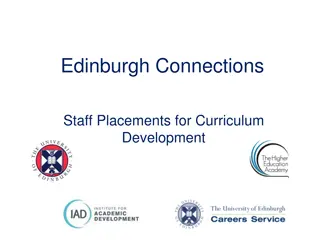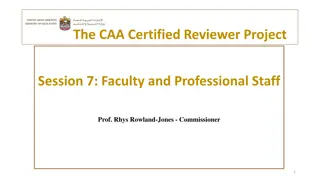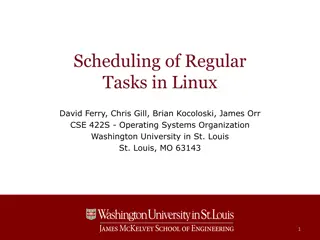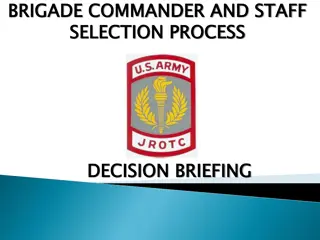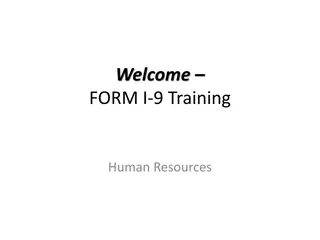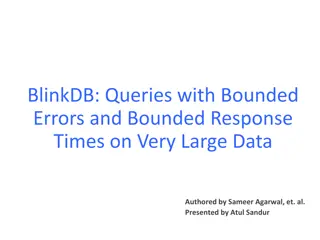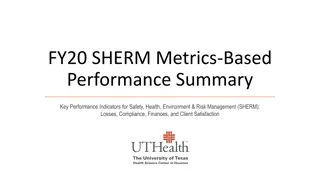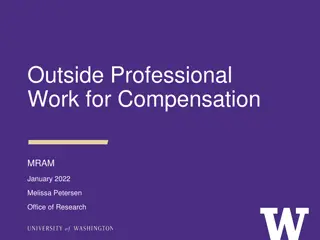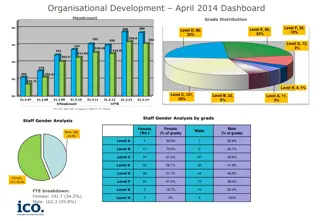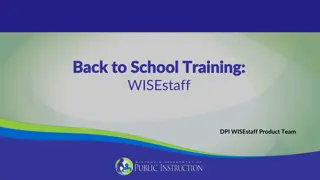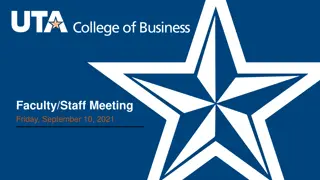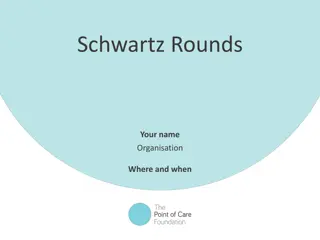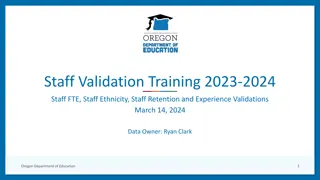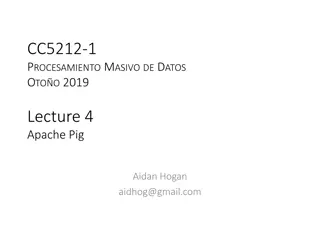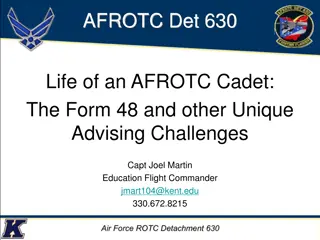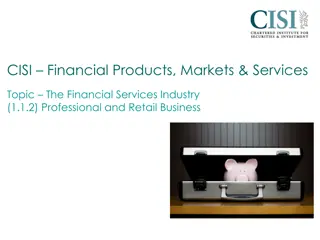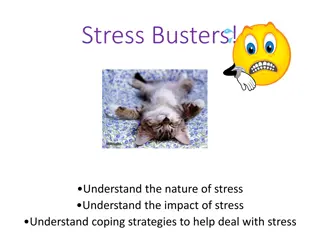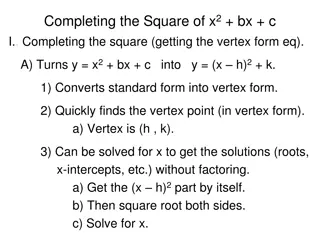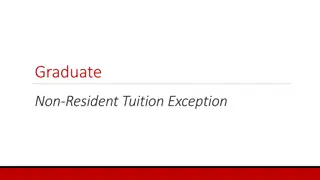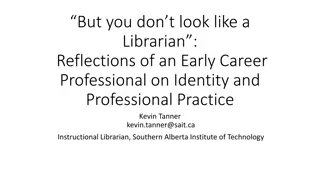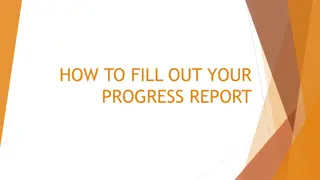Understanding Professional Staff Workloads and the E7 Form Process
This presentation provides essential information on professional staff workloads, the importance of the E7 form, and the process involved in defining job duties and responsibilities. It outlines the role of the E7 form in detailing job descriptions, the need for annual review and potential revisions, and guidelines for staff members to request changes. The content emphasizes the significance of alignment between the letter of appointment, classification specifications, and position descriptions to ensure clarity and consistency in job roles.
Download Presentation

Please find below an Image/Link to download the presentation.
The content on the website is provided AS IS for your information and personal use only. It may not be sold, licensed, or shared on other websites without obtaining consent from the author. Download presentation by click this link. If you encounter any issues during the download, it is possible that the publisher has removed the file from their server.
E N D
Presentation Transcript
Professional Staff Workloads and the E7 Form Process
One important note: this presentation is for training purposes only and doesn t cover every minor detail - thus this presentation should not be understood to be a definitive interpretation of the Massachusetts Community College Council Day contract (in particular Articles 11 & 12).
What is your job There are three documents that help define your job. Letter of appointment E-7 Classification specifications. https://www.mass.edu/forfacstaff/classificationspecs/home.asp Job description items on the E-7 should be consistent with classification specifications Classification specifications list a particular pay grade for each position.
Article XII Professional Staff workloads are addressed in Articles 12.04-12.06 of the MCCC Day contract. Professional staff should have a position description in addition to their letter of appointment. That description is called an E7 after the form in the contract. Every professional staff member should have a position description on an E7 form. The form should be revisited and potentially revised by July 1 every year. A new E7 should be sent by July 31 every year.
What is an E7 The E7 should have a professional staff members job duties, responsibilities, and related activities. Duties, responsibilities, and related actives can be changed during the year. If the happens the administration must meet with you. If substantive and ongoing duties are modified and/or added then the administration should give you a new E7 withing 30 days of meeting. Professional Staff members may also request changes to their E7.
What you can do: before E-7 meeting Know what you classification is and review the specifications. Specifications are found at: https://www.mass.edu/forfacstaff/classificationspecs/home.asp Keep a log of your job duties and the amount of time, per week or month you are spending on each one Make a list of any additional duties that are NOT reflected on your E-7. If you intend to seek reclassification, look up the classification specifications for the position you wish to be reclassified into: Talk to you coworkers to see if there are areas of common concern with regard to E-7, and plan to coordinate asks where possible
What you can do: during E-7 meeting If you feel there are more duties on your E-7 than can be completed in a 37.5 hour week, use your work log to make the case something should be taken off If management adds duties to your E-7, insist that something else should be taken off so that it fits in a 37.5 hour week and request a revision of your E-7 Engage in a back-and-forth over job duties and work objectives. If you are doing something that is not on your E-7, ask for it rewritten to reflect that work. If management declines to add duties you are already doing to your E-7, state in writing that you will no longer be completing those duties Ask your supervisor to identify what the successful result of a goal, method, or objective looks like, especially those that are subjective provides excellent service
What you can do: after E-7 meeting If the meeting is not going as you had hoped, ask to schedule a follow-up meeting and continue the conversation Connect with your coworkers and consider engaging in concerted activity around the E-7 process, i.e. requesting a group meeting with HR Contact your chapter leadership to see if there is a viable grievance. Article 12 is fully grievable and arbitrable. You can hold off on signing your E-7 while conversations are ongoing. If management insists, sign but also write a note you don t believe the E-7 is correct and after the meeting immediately consult your chapter leadership.
Other Duties Most, if not all, E7s will include the phrase other duties as assigned. Those duties must be related the work of the position in general (on the E7). Ex. an advisor should not be asked to do Librarian work. If you are regularly asked to do a task as an other duty you should strongly consider requesting it be added to your E7.
E7s and classification You want to make sure you have a E7 so your job duties are clear and defined rather than infinite and/or ambiguous. If you want to reclassify your position (to move to a higher grade of pay) your application will be compared against your E7. That means you need to have one and you need to properly reflect everything you do. (Not all classifications have a higher classification). You need have a complete E7 before applying for reclassification. An E7 should NOT be a list of everything in a classification spec. Specs are a list of all the possible duties someone with that title could be doing, not a list of everything one person should be doing in one job it is too much. The classification specifications can be found here: https://www.mass.edu/forfacstaff/classificationspecs/home.asp
Reclassification (Article 21.09) If you feel that you are doing work that is more appropriate for a higher classification you can request a review by HR to be reclassified. Compare your E7 to your current classification specification and see if there a different specification that more closely reflects your work (you will need to explain how as part of your request). Make a list of duties that align with the higher classification are on your E-7. Remember that if there are duties that you perform on a regular basis that are not on your E-7 you should revise your E-7 before requesting a review. The college will audit your position (based on your E7) and give a written decision within 90 days. They must respond to the request. Use form XXI-4 in the MCCC Day contract to request a review. If HR denies you there is an appeal process, but it still requires administration approval to be reclassified.
E7s and evaluation You also want an accurate E7 as that is what you will be evaluated against it is 75% of the evaluation. 13.03 B 1 - The President of the College or the President s designee shall annually evaluate each professional staff member, except as provided in Article 13.04, and shall consider only the components listed below. The results of the evaluation shall be applied in a uniform manner and shall be assigned the following weights: Work Performance 75% College Service 10% Personnel File Review 15% 13.03 B 2 The basis for evaluation of job duties and responsibilities shall be the annual E-7 Form or Forms if an employee had more than one E-7 during the evaluation year.
Who to contact with questions: Start with your chapter leadership, as they should always be in the loop MTA Field Representatives Colleen Fitzpatrick cfitzpatrick@massteacher.org Mass Bay, Bunker Hill, Massasoit, Bristol, Cape Cod Bret Seferian bseferian@massteacher.org North Shore, Northern Essex, Roxbury, Quinsigamond, Middlesex Tyler Rocco-Chaffee trocco@massteacher.org Holyoke, Greenfield, Berkshire, Springfield Tech, Mt. Wachusett MCCC Day Grievance Coordinator Dennis Fitzgerald - mcccfitzy@comcast.net
Full-time Professional Staff workload A work week is 37.5 hours. A workday is 7.5 hours between 8:00am-5:00pm. The administration can t require you to work more than 5 days in a row. The administration has to give you 14 days notice before changing your normal work schedule. When someone works over 37.5 hours the administration will give them 1.5 hours of comp time for each hour worked. Comp time can t exceed 75 hours if someone has 75 hours of comp time then all additional hours will be paid at the professional staff member s normal rate of pay. Professional Staff members get three professional staff days (one is the day after Thanksgiving) for participation in off-campus activities outside those assigned. These days can be used very broadly administration lawyers have said it can used to read a book. All time spent in student advisement (if assigned), in attendance at conferences, meetings and student activities when such attendance is required during the workdays shall be counted in the professional staff member's weekly and daily hours.
Part-time Professional Staff Professional Staff who work 224 or more hours in a fiscal year (July-June) also receive E7s. The administration shall give part-time Professional Staff members an E7 with 21 days of their start. Part-time Professional Staff who work 225 hours in a year earn seniority after three years. The administration shall of appointments with those with seniority first. Working 225-900 hours a year will give a year of seniority. Working more than 900 hours will give 1 year of seniority. Part-time staff earn seniority in every work area in which they work at least 225 hours The administration shall put out a seniority list including part-time Professional Staff every August 15.
Part-time Professional Staff: All-Purpose Professional Leave (APPL) Article 9.07 Requires prior written approval of supervisor, except in the case of unforeseen circumstances in which case notify as early as possible Must be taken in 2+ hour increments Requests shall not be unreasonably denied Use by end of fiscal year or June 30th *New language* upon showing of good cause, any or all unused all-purpose leave may be permitted to be carried over to next fiscal year Whenever a College is closed due to inclement weather or other emergency situations, the administration has to part-time professional staff members for the hours missed due to the closure
Part-time Professional Staff: All-Purpose Professional Leave (APPL) Article 9.07 New and Improved Accrual Structure Hours Worked Previous Fiscal Year 0-50 51-224 225-299 300+ Hours Credited Next Fiscal Year 0 7.5 15 22.5



